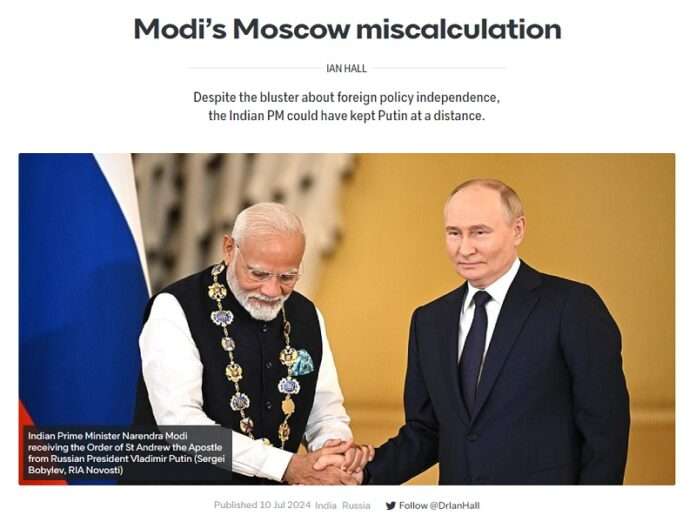Ian Hall is one of Australia’s most influential experts on the Indo-Pacific, whose opinions on India carry heavy weight because of the authority that he commands among policymakers as well as his country’s role in the Quad. That’s why it’s so important to correct the false perceptions contained in his latest piece about “Modi’s Moscow miscalculation”, where he argues that “the Indian PM could have kept Putin at a distance” instead of visiting him, let alone bearhugging him during their informal meeting.
Hall’s point is that the visit only produced nine supposedly insignificant agreements and secured the release of Indians who were reportedly duped into joining the Russian Armed Forces. According to him, the first don’t matter much while the second should have been ensured long ago without the premier having to get involved. He then segues into describing India as the dominant partner of the two, but then paradoxically claims that it’s incapable of influencing Russia’s shift towards China.
The problem with his opinion is that it isn’t cogent and comes off more as an attempt to discredit Modi for privileging his country’s strategic partnership with Russia than an honest critique of his trip. It also ignores that his trip was indeed predicated on influencing the abovementioned shift, whose developments since the start of the year were detailed here, while this analysis here explains how he succeeded. Of course, Hall will be reluctant to recognize this, and that’s because he has an agenda.
Western academia and the associated think tank community are more akin to lobbyists nowadays than to objective experts and analysts like the public still imagines them as being. Instead of trying to reflect reality as accurately as they can, they prefer to twist it in pursuit of a preplanned narrative, which in Hall’s case is to discredit Modi and Indian foreign policy as a means of pressuring them to switch gears. That’s not going to succeed though since India has proven that it’s resilient to Western pressure.
The reason why Modi’s trip to Moscow was a masterstroke and not a miscalculation is because it keeps tri–multipolarity processes on track after it appeared since the start of the year that Russia was preparing to pivot to China and thus revive a form of Sino-US bi-multipolarity to its own and India’s detriment. This was explained in the earlier hyperlinked piece, with the takeaway being that Russia’s emerging pro-BRI faction will now be controlled while its establishment balancing/pragmatic rivals remain predominant.
This outcome upsets Westerners, who Indian expert Surya Kanegaonkar accurately described as either proponents of unipolarity or bipolarity based on whether they’re hawks or doves on China respectively. Neither faction truly accepts his country’s status as a strategically autonomous power in the global systemic transition, instead continually pressuring it in order to control its rise. By contrast, Russia’s predominant policymaking fully accepts and wants to accelerate this, hence India’s preference for Russia.
That’s not to say that India is anti-Western since External Affairs Minister Dr. Subrahmanyam Jaishankar already clarified that his civilization-state’s non-Western identity doesn’t automatically equate to that. Rather, the point is simply that Russia is a more privileged and respected partner than the West, the latter of which doesn’t accept India’s envisaged global role and wants to continually influence its policies. Accordingly, India is impervious to Western criticism, and it’ll never bow under pressure from anyone.
Back to the lede, Hall remains guided by the false perception that elite opinion can influence Indian policymakers, which is counterproductive for Western interests since it’ll only make his target audience more recalcitrant out of principled defiance. What he dishonestly misportrays as a miscalculation is actually a masterstroke since Modi’s trip to Moscow got tri-multipolarity processes back on track, though that’s precisely why the West is so angry at him since they only want unipolarity or bi-multipolarity.







